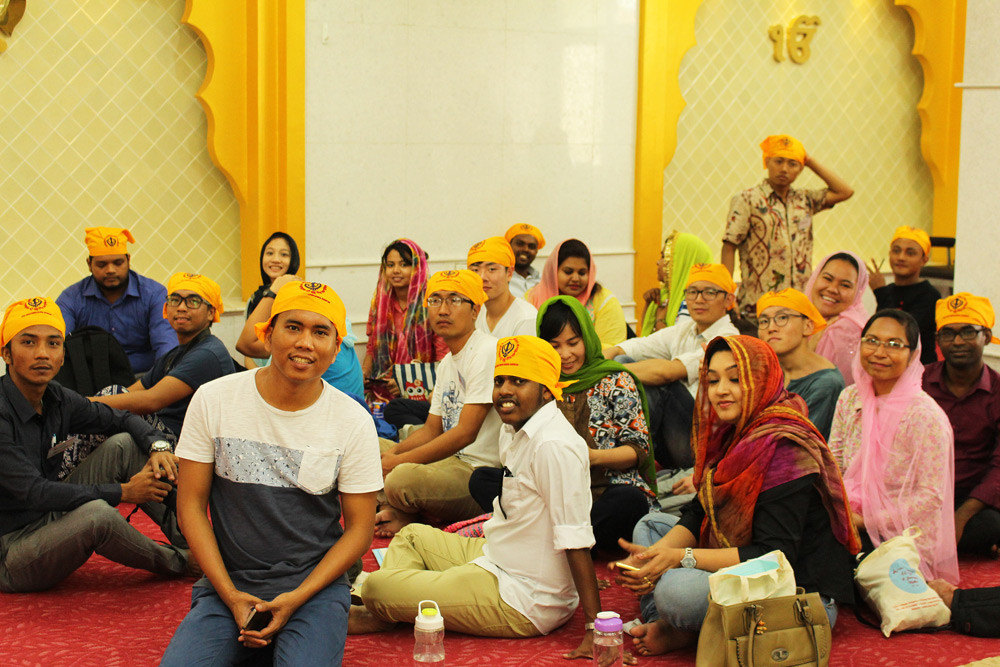Young peace activists develop action plans for conflict transformation in local communities
 YAPA 2017 participants at a Gurudwara / Sikh temple in Chiang Mai, Thailand.
YAPA 2017 participants at a Gurudwara / Sikh temple in Chiang Mai, Thailand.
“Peace cannot prevail without justice to attain a dignified existence. Peace is a journey towards a relationship with God, neighbour and the entire creation in transforming and reconciling through inter-religious, interfaith and intra-faith dialogue. In celebrating Asia’s diversity, we acknowledge our own differences and proclaim to be inclusive communities in the household of God. We value inner peace, peace within communities and peace with nature as holistic approaches to conflict transformation,” stated the communiqué adopted by a group of Young Ambassadors of Peace in Asia (YAPA).
The participants of YAPA 2017, a week-long training organised by the Christian Conference of Asia (CCA) held from 28 May to 3 June, 2017 at Payap University in Chiang Mai, Thailand, developed action plans for peacebuilding in Asia.
“We are to be the bearers of peace when there is hatred, political violence, religious radicalism, discrimination, socio-cultural segregation and all other issues that violate the dignity of creation,” a participant from East Nusa Tenggara, Indonesia, Elina Welmiria Otu said.
The main objective of the annual YAPA training programme is to promote the role of young people as positive actors of change in peacebuilding processes, and to build a network of young peacebuilders in Asia as key stakeholders in the region to secure sustainable peace.
During the week-long training, participants developed action plans for peacebuilding through interfaith platforms in their local communities.
“After attending the YAPA training, I realise that peace is not about just finding answers. It is about questioning. Curiosity of conflicts, violence and mending broken relationships is important for conflict transformation,” Ju Young Alex Lee from South Korea said.
The training programme consisted of various interactive sessions on non-violence with theological underpinnings of peace, teaching of skills to implement peace programmes at the grassroots level and building inter-religious action plans for initiating peace education in the region.
“I learned crucial ways of engaging youth for peace whilst valuing pluralism in Asian contexts. The YAPA training has equipped me with community action-oriented approaches to prepare contextual responses to conflict situations, relationship building and justice affirmation,” Prince David Kirubakaran from India said.
Attended by 25 participants, the YAPA 2017 included representatives from the Buddhist, Hindu and Muslim communities who are committed to promoting interfaith collaboration in peacebuilding and conflict resolution.
YAPA, an annual training programme initiated by the CCA in 2016, aims at training young peace activists in Asia.
Communiqué
YAPA 2017:
The Youth of Asia calls for Peace with Justice
We, the participants of Young Ambassadors of Peace in Asia (YAPA) 2017, from different countries belonging to different faiths, attended the YAPA 2017 training programme, organised by the Christian Conference of Asia (CCA) at the CCA Headquarters at Payap University in Chiang Mai, Thailand from May 29 to June 2, 2017. During this time, we were trained in intercultural and interfaith learning as a base for addressing conflict transformation and nurturing our role as peacebuilders in our respective societies across Asia.
Affirmations
- We affirm that peace cannot prevail without justice to attain a dignified existence. Peace is a journey towards a relationship with God, neighbour and the whole creation in transforming and reconciling through inter-religious, interfaith and intra-faith dialogue.
- We emphasis upon celebrating diversity, we acknowledge our own differences and reaffirm inclusive communities in the household of God.
- We value inner peace, interpersonal peace, peace within communities and peace with nature as holistic approaches to peacebuilding.
- We emphasis that justice removes obstacles to peace; peace that sustains the co-relation of the whole creation where equality dwells. Equality resides across gender, class and every sector in society.
Condemnations
- We condemn all violations of human rights and dignity that deny the celebration of the fullness of life;
- We condemn all human rights abuses in terms of human trafficking, child labour, extra-judicial killings and sexual violence for the benefit of the few in power;
- We condemn discrimination and oppression on the basis of race, caste, class, creed, ethnicity and gender;
- We condemn the misuse of militarisation that denies the rights, security and liberty of the innocent people;
- We condemn religious intolerance and the enforcement of fundamental religious ideologies and practices against the will and consent of others.
Call For Action
As a new generation of activists committed to work for structural transformation that promotes harmony and peace based on justice in Asian communities, we call unto:
- Religious leaders and bodies to bridge the gaps in relationships across religious boundaries to foster peace with justice and religious harmony to uphold our cultural roots and ethnic identities;
- Young people and peace advocates to unlearn concepts that invite exclusions, prejudices and stereotypes, and to relearn notions that inculcate critical thinking to establish an inclusive community;
- Municipalities and corporate organisations to engage in community-based services that enhance the livelihood of the common people;
- The governments to review, revise and contextualise laws based on contemporary perspectives that are beneficial to all members of societies;
- And, every individual who believes in building peace in society to practice reconciliation. This redemptive process is the path towards valuing the good in humanity.











